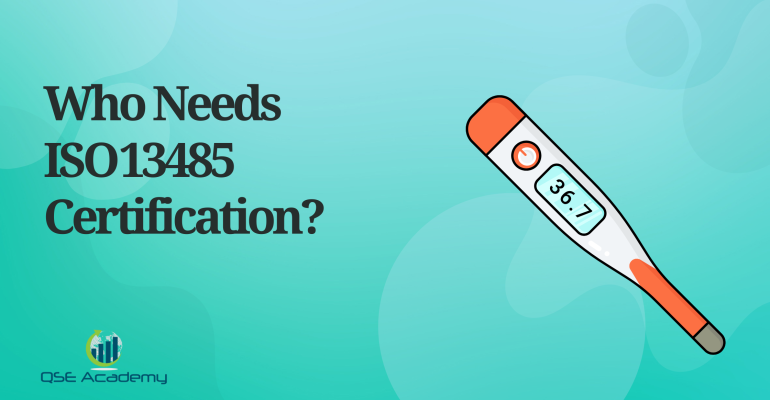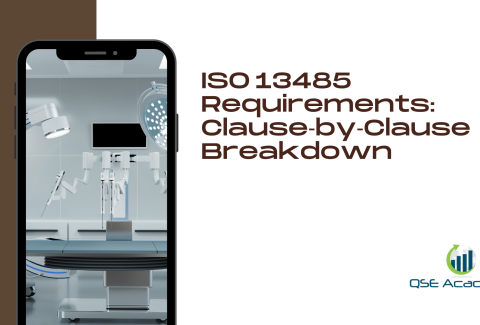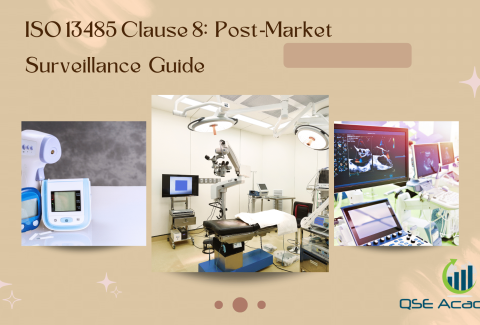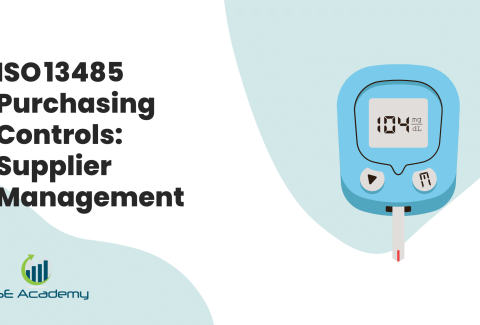Who Needs ISO 13485 Certification?
Last Updated on October 3, 2025 by Hafsa J.
Introduction: Do You Really Need ISO 13485?
Here’s what I’ve noticed after years of working with medical device companies and their suppliers: one of the most common questions that comes up is “Do we actually need ISO 13485 certification?” It’s a fair question—getting certified isn’t cheap, and it requires a serious commitment from your team.
In my experience, the confusion usually comes from mixing up ISO 9001 (the general quality standard) with ISO 13485 (the medical device–specific one). Many businesses assume that if they already have ISO 9001, they’re covered. The reality? If you’re in or anywhere near the medical device space, ISO 13485 is the standard regulators, customers, and partners expect. Without it, you’ll hit roadblocks—whether that’s in product approvals, market access, or simply winning contracts.
The good news is that not every company in healthcare needs ISO 13485. But if you manufacture, supply, or even distribute medical devices, chances are it applies to you. In this article, I’ll break down exactly who needs ISO 13485 certification and why, with real-world examples to help you see where your organization fits.
Now that we’ve set the stage, let’s start by quickly recapping what ISO 13485 is really about—and why it matters.
Understanding ISO 13485: Beyond the Basics
Before we get into who needs ISO 13485, let’s clear up what it actually is. ISO 13485 is the international quality management system (QMS) standard designed specifically for the medical device industry. Unlike ISO 9001, which is broad and applies to any business, ISO 13485 zeroes in on one thing: ensuring medical devices are consistently safe, effective, and compliant with global regulations.
Here’s the key point—this standard isn’t about boosting efficiency or improving customer satisfaction (though those are nice side effects). It’s about protecting patients and meeting regulatory requirements. That’s why regulators in Europe, Canada, and many other markets look for ISO 13485 certification as proof that a company can be trusted to make or handle medical devices.
In my experience, companies often underestimate this. They think they can “get by” with ISO 9001 and still enter medical markets. But regulators don’t see it that way. ISO 13485 adds requirements around risk management, traceability, documentation, and regulatory reporting that simply aren’t covered in ISO 9001.
Pro tip: even if you’re not a manufacturer, adopting ISO 13485 can give you a competitive edge. I’ve seen suppliers win contracts over competitors simply because they held certification—customers knew they could rely on their systems.
Now that you know the purpose of ISO 13485, let’s talk about the most obvious group that needs it: medical device manufacturers.
Medical Device Manufacturers: The Primary Audience
If there’s one group that absolutely, without question, needs ISO 13485 certification, it’s medical device manufacturers. Whether you’re making surgical instruments, diagnostic equipment, or even simple disposable products like syringes, regulators expect you to be certified.
Here’s why: medical devices directly impact patient health and safety. That means every process—from design to production to post-market monitoring—has to be tightly controlled and fully documented. ISO 13485 provides the framework to prove you’ve done exactly that. Without it, approvals in key markets like the EU (under MDR) or Canada are simply off the table.
In my experience, a common pitfall for new manufacturers is assuming ISO 9001 is “good enough.” It’s not. ISO 9001 shows you’re serious about quality, but it doesn’t go nearly far enough into regulatory compliance, risk management, or traceability. I once worked with a start-up that tried to launch in Europe with only ISO 9001. The result? Months of delays, extra costs, and frustrated investors until they went through ISO 13485 certification.
Pro tip: even if you’re still in early product development, starting with ISO 13485 saves headaches later. It builds compliance into your design process from day one instead of forcing you to retrofit systems when auditors come knocking.
Now that we’ve covered manufacturers, let’s move one step down the chain and look at another group that often gets overlooked—component and accessory suppliers.
Component and Accessory Suppliers
Here’s something a lot of suppliers don’t realize: even if you’re not building the finished medical device, you may still need ISO 13485 certification. Why? Because regulators and manufacturers expect every critical component and accessory to meet the same safety and quality standards as the final product.
Think about it—if you supply circuit boards for a heart monitor, plastic housings for surgical tools, or sterilization services for implants, any defect in your process could directly affect patient safety. That’s why many medical device companies require their suppliers to hold ISO 13485 certification before they’ll even sign a contract.
Pro tip: certification isn’t always legally mandatory for suppliers, but it’s often a competitive edge. I’ve seen suppliers win long-term contracts simply because they could show auditors and OEM partners a certified QMS. On the flip side, I’ve also seen companies lose business because they couldn’t demonstrate compliance.
A quick example: a plastics manufacturer I worked with wasn’t legally required to get ISO 13485. But once they did, they landed bigger contracts with multiple medtech OEMs—because they could prove their processes matched regulatory expectations.
Now that we’ve covered suppliers, let’s move to another critical group that can’t afford to ignore ISO 13485: contract manufacturers and OEM partners.
Contract Manufacturers and OEM Partners
If you’re a contract manufacturer producing medical devices on behalf of another company, ISO 13485 certification is pretty much non-negotiable. The brand owner can’t simply “cover” you with their certification—you need to prove your own compliance. Regulators and auditors want to see that your processes meet the same standard of safety and traceability.
Here’s what I’ve noticed: contract manufacturers sometimes assume their client’s certification is enough. It’s not. During audits, regulators will ask to see evidence that every part of the supply chain is compliant. If your name is on the manufacturing records, you’re on the hook.
Pro tip: holding ISO 13485 as a contract manufacturer doesn’t just keep you compliant—it makes you a much more attractive partner. Medical device companies are far more likely to outsource to a manufacturer who can show a proven, certified QMS.
A quick story to bring this home: I worked with a mid-sized electronics manufacturer that pivoted into medtech by producing diagnostic equipment for a global OEM. Their biggest breakthrough came after they achieved ISO 13485—the OEM immediately expanded the partnership because they could trust the manufacturer to pass audits without issue.
So, whether you’re a contract manufacturer or an OEM partner, ISO 13485 is your golden ticket to winning—and keeping—those high-value contracts.
Next up, let’s look at a group that’s often forgotten in these discussions: distributors and importers in regulated markets.
Distributors and Importers in Regulated Markets
Distributors and importers often think ISO 13485 doesn’t apply to them because they’re not directly making the devices. But here’s the reality: in many regulated markets, you’re still part of the compliance chain. That means regulators can (and do) hold you accountable for ensuring the devices you handle meet quality and safety standards.
Take the EU MDR, for example. Importers and distributors are expected to verify CE marking, check documentation, and make sure products are traceable. While the law doesn’t always demand ISO 13485 certification, having it in place makes your role much easier—and far more defensible during audits.
Pro tip: even when it’s not legally required, certification builds trust. Manufacturers prefer working with distributors and importers who can demonstrate ISO 13485 compliance because it reduces their own risk exposure.
I’ve seen this play out firsthand. One distributor I worked with in Europe wasn’t legally obliged to get certified, but once they did, they secured exclusive deals with several medtech companies. Why? Because those companies trusted that the distributor wouldn’t become a weak link in the supply chain.
So while distributors and importers may not always be mandated to hold ISO 13485, it often becomes a business advantage—and in some cases, practically essential to operate smoothly in regulated markets.
Next, let’s turn to an exciting group: startups and innovators entering the medtech space.
Startups and Innovators Entering MedTech
If you’re a startup developing a new medical device, you might be wondering: “Do we really need ISO 13485 this early?” The truth is, yes—if you’re serious about bringing your product to market.
Here’s what I’ve noticed: investors, regulators, and even potential partners look for ISO 13485 as a sign that you’re building compliance into your business from day one. Without it, you risk delays in product approvals, missed funding opportunities, and resistance from hospitals or clinics that want reassurance you’re following the right standards.
Pro tip: don’t wait until after you’ve finished developing your device to think about certification. It’s much easier (and cheaper) to embed ISO 13485 processes into your design and development early, rather than trying to retrofit your documentation later.
A real-world example: I worked with a wearable device startup that adopted ISO 13485 before they even launched their first pilot. The result? Faster approval in the EU, smoother fundraising rounds, and early trust from hospital partners. Their competitors, who treated certification as an afterthought, spent months scrambling to catch up.
Bottom line: for medtech startups, ISO 13485 isn’t just a regulatory checkbox—it’s a credibility booster and growth accelerator.
Now, to wrap up the main section, let’s clarify something important: who doesn’t strictly need certification, but can still benefit from it.
Who Doesn’t Need Certification But Still Benefits
Not every organization in the healthcare ecosystem is legally required to hold ISO 13485 certification. For example, some testing labs, secondary service providers, or non-critical component suppliers can operate without it. But here’s the catch: even when it’s not mandatory, certification can still open doors.
Here’s what I’ve seen happen: a company starts off supplying low-risk materials to the medical industry—say, packaging or basic electronics. Technically, they don’t need certification. But when they try to land bigger clients or expand into new markets, the first question buyers ask is: “Are you ISO 13485 certified?” Suddenly, what was “optional” becomes a deal-breaker.
Pro tip: if you’re planning to scale, certification is often less about immediate necessity and more about future-proofing. Even if you can manage without it today, chances are you’ll need it tomorrow if you want to grow or compete for higher-value contracts.
I once worked with a logistics provider specializing in transporting sensitive devices. Certification wasn’t legally required, but after achieving ISO 13485, they became the go-to partner for several multinational medtech companies. It wasn’t compliance that won them the contracts—it was the trust certification created.
So while some organizations can technically skip ISO 13485, choosing to pursue it anyway can be a smart strategic move.
Now that we’ve mapped out who does—and doesn’t—need certification, let’s tackle some of the most common questions companies ask me on this topic.
FAQs: Who Needs ISO 13485 Certification?
Q1. Is ISO 13485 mandatory for all companies in healthcare?
No, not for everyone. ISO 13485 is mandatory for medical device manufacturers and often for their critical suppliers or contract manufacturers. But service providers or non-critical suppliers may not be legally required to certify. That said, many still choose to, because it builds credibility and attracts bigger clients.
Q2. Can a supplier work with medical device companies without certification?
Sometimes, yes—but it’s becoming less common. Most major manufacturers prefer (or even require) their suppliers to be ISO 13485 certified. If you’re not, you’ll need to prove compliance through extra audits or paperwork, which can make you less attractive compared to certified competitors.
Q3. Do startups need ISO 13485 before launching a product?
If you’re planning to sell in regulated markets (like the EU or Canada), yes. Certification streamlines product approval and boosts investor and partner confidence. Skipping it usually leads to delays, extra costs, and tougher regulatory reviews.
Conclusion: Do You Fall Into the ISO 13485 Category?
By now, it should be clear: ISO 13485 isn’t a one-size-fits-all requirement—it’s targeted. If you’re a medical device manufacturer, a contract manufacturer, or a key supplier, certification isn’t optional—it’s essential. For distributors, importers, and startups, it may not always be legally mandated, but in practice, it often becomes the difference between growth and roadblocks.
Here’s what I’ve noticed after guiding dozens of companies: the ones that treat certification as a strategic investment—not just a compliance burden—are the ones who move faster in their markets and win more trust from regulators, partners, and customers.
So, where does that leave you? If you’re unsure whether ISO 13485 applies to your business today, the smartest first step is a gap or readiness analysis. That way, you’ll know exactly what’s required, what’s optional, and what could give you a competitive edge.
At the end of the day, ISO 13485 isn’t just about passing an audit—it’s about building credibility, ensuring patient safety, and opening doors to global markets. If that’s on your roadmap, certification isn’t just “nice to have”—it’s your ticket forward.
Whether it’s ISO 9001, ISO 22000, or the cosmetics-focused ISO 22716, I’ve spent my career I’m not here to call myself an expert—I prefer “enthusiast” because I truly love what I do. When I’m not writing about standards, you’ll probably find me playing Piano 🎹, connecting with people, or diving into my next big project💫. I’m an engineer specialized in the food and agricultural industry
make ISO standards less intimidating and more approachable for everyone.
turning complex jargon into clear, actionable steps that businesses can actually use.
There’s something incredibly rewarding about helping people navigate food safety and quality management systems
in a way that feels simple, practical, and even enjoyable.
I have a Master’s in QHSE management and over 12 years of experience as a Quality Manager
I’ve helped more than 15 companies implement ISO 9001, ISO 22000, ISO 22716, GMP, and other standards
My clients include food producers, cosmetics manufacturers, laboratories, and service companies
I believe quality systems should be simple, useful, and efficient.










